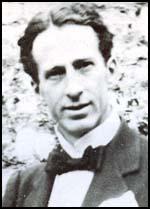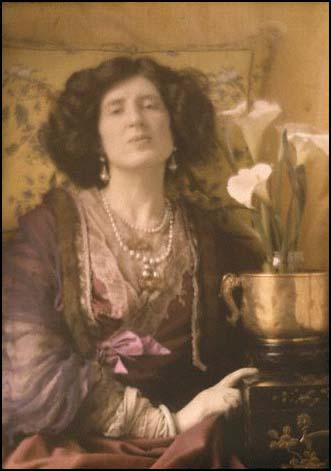Philip Morrell

Philip Morrell, the son of Frederick Morrell and Harriet Wynter, was born on 4th June 1870. After an education at Eton College and Balliol College. After leaving the University of Oxford Morrell became a member of the firm of solicitors, Philpot and Morrell.
In 1899, Morrell saw Ottoline Cavendish-Bentinck while "cycling to college dressed all in white with her red hair blazing". At the time Ottoline was studying political economy and Roman history as an out-student at Somerville College. At first she rejected his advances. As one biographer pointed out: "Ottoline was still determined to find her father figure, and this solicitor, however charming and friendly, seemed too young."
Morrell pursued Ottoline for two years. In letter to him she revealed grave doubts about the physical side of their relationship. However, she was willing to have a relationship with him "based on affection and trust rather than passion." They were eventually married in February 1902.
According to Vanessa Curtis: "Unexpectedly, the roles were reversed immediately after their honeymoon; Philip suddenly admitted that he found it hard to be sexually attracted to her. This was a shock to Ottoline, but it did not affect the immense loyalty that they both had to the marriage, which stood the test of time and was strong enough to survive their considerably involved love affairs with other people."
The couple settled at 39 Grosvenor Road. Phillip Morrell was an active member of the Liberal Party and in 1903 his wife helped him in his unsuccessful attempt to represent Henley in Oxfordshire. Morrell was a great womaniser and his first illegitimate child, a daughter, was born in 1904. Around this time they agreed to have an open marriage. Ottoline Morrell had twins on 18th May 1906. The boy, named Hugh, died of a brain haemorrhage, two days later. Her daughter survived and was named Julian in memory of her mother's old friend in Cornwall. Soon afterwards she was told that the traumatic birth had ended any chance of her having further children. The child was buried at Clifton Hampden and Ottoline continued to visit the graveyard for the next thirty years.
In the 1906 General Election Morrell won Henley. The family now set up home at 44 Bedford Square in Bloomsbury. In 1907 the Morrells rented a second home, Peppard Cottage. Ottoline became very interested in modern art and became influenced by the views of Roger Fry. He suggested that she took a look at the work of Mark Gertler and Stanley Spencer. Ottoline also received advice from the art collector, Edward Marsh and the writer, Gilbert Cannan. She also promoted the careers of Augustus John, Duncan Grant, Jacob Epstein and Henry Lamb. Her biographer, Miranda Seymour has argued: "Some became her lovers; few were able to resist her combination of innocence, aristocracy, and the singularity of a true eccentric." In 1907, she began holding weekly parties at Bedford Square for the artists and writers she met and whom she hoped to help by offering introductions to rich patrons.
Philip Morrell was defeated at Henley in the January 1910 General Election but won Burnley in December, 1910. He was on the left of the party and was seen as a strong supporter of David Lloyd George.
Roger Fry, who accepted a large sum of money from her towards help for his mentally ill wife, began to fall in love with her. However, his advances were rejected because she had just begun an intense affair with the artist, Henry Lamb. According to Vanessa Curtis: "Lamb was an Adonis, with curly blond hair, a slim figure and a unique way of dressing in old-fashioned silk or velvet garments. He sported a gold earring and had a playful sense of humour. When he was in a good mood he proved an enchanting and alluring companion for Ottoline, but when he was depressed and bad-tempered, it took all of her natural patience and love to see them both through these difficult periods."

Ottoline Morrell began an affair with Bertrand Russell in March 1911. Her biographer, Miranda Seymour has pointed out: "In 1911, disenchanted by his first wife, Alys Pearsall Smith, Russell turned to Ottoline and was, for a time, inspired by her, although he could not sympathize with her Christian beliefs. Their relationship was fought over and celebrated in a remarkable correspondence, often amounting to four letters a day. Ottoline's sexual coldness and Russell's possessiveness caused difficulties which prompted suicide threats on both sides."
Vanessa Curtis argues: "Their affair, which lasted for the next five years, was bet with problems and imbalances from the start... It was always Ottoline who threatened to end the relationship, and so they would get stuck in patterns of enforced silences and absences, which would be broken by a miserable Bertrand begging to see her, professing undying love... Bertie eventually left Alys, his wife, after a bitter and nasty feud, but Ottoline would not even contemplate leaving Philip. Her marriage meant too much to her, and Philip had started suffering from periods of mental instability, which meant that he had a greater need for his wife's love and support."
On the outbreak of the First World War, Philip Morrell joined forces with several other leading political figures to establish the Union of Democratic Control. The UDC had three main objectives: (1) that in future to prevent secret diplomacy there should be parliamentary control over foreign policy; (2) there should be negotiations after the war with other democratic European countries in an attempt to form an organisation to help prevent future conflicts; (3) that at the end of the war the peace terms should neither humiliate the defeated nation nor artificially rearrange frontiers as this might provide a cause for future wars.
Other members of the UDC included Charles Trevelyan, Norman Angell, E. D. Morel, Ramsay MacDonald, John Morley, J. A. Hobson, Charles Buxton, Frederick Pethick-Lawrence, Arnold Rowntree, Morgan Philips Price, George Cadbury, Helena Swanwick, Fred Jowett, Tom Johnston, Bertrand Russell, Philip Snowden, Ethel Snowden, David Kirkwood, William Anderson, Mary Sheepshanks, Isabella Ford, H. H. Brailsford, Israel Zangwill, Margaret Llewelyn Davies, Konni Zilliacus, Margaret Sackville and Olive Schreiner.
The Union of Democratic Control soon emerged at the most important of all the anti-war organizations in Britain and by 1915 had 300,000 members. The Daily Express listed details of future UDC meetings and encouraged its readers to go and break-up them up. Although the UDC complained to the Home Secretary about what it called "an incitement to violence" by the newspaper, he refused to take any action. Over the next few months the police refuse to protect UDC speakers and they were often attacked by angry crowds. After one particularly violent event on 29th November, 1915, the newspaper proudly reported the "utter rout of the pro-Germans".
The Morrells purchased Garsington Manor near Oxford at the beginning of the First World War and became a refuge for conscientious objectors. They worked on the property's farm as a way of escaping prosecution. It also became a meeting place for a group of intellectuals described as the Bloomsbury Group. Members included Virginia Woolf, Vanessa Bell, Clive Bell, John Maynard Keynes, E. M. Forster, Duncan Grant, Lytton Strachey, Dora Carrington, Gerald Brenan, Ralph Partridge, Vita Sackville-West, Bertram Russell, Leonard Woolf, David Garnett, Desmond MacCarthy and Arthur Waley.
One of the members of this group, Frances Partridge, later recalled in her autobiography, Memories (1981): "They were not a group, but a number of very different individuals, who shared certain attitudes to life, and happened to be friends or lovers. To say they were unconventional suggests deliberate flouting of rules; it was rather that they were quite uninterested in conventions, but passionately in ideas. Generally speaking they were left-wing, atheists, pacifists in the First World War, lovers of the arts and travel, avid readers, Francophiles. Apart from the various occupations such as writing, painting, economics, which they pursued with dedication, what they enjoyed most was talk - talk of every description, from the most abstract to the most hilariously ribald and profane."
Other people who spent time at Garsington Manor included Siegfried Sassoon, Aldous Huxley, Dorothy Brett, D.H. Lawrence, Frieda Lawrence, Mark Gertler, Ethel Smyth, Katherine Mansfield, John Middleton Murray, Goldsworthy Lowes Dickinson, Thomas Hardy, Vita Sackville-West, Herbert Asquith, Harold Nicolson and T.S. Eliot.
Financial difficulties led to the sale of Garsington Manor in 1928. Ottoline and Philip Morrell moved to a more modest home, 10 Gower Street. Soon afterwards Ottoline Morrell developed cancer of the jaw, which meant a long stay in hospital and an operation to have her lower teeth extracted and part of her jawbone removed. She told her friends that the "pain was indescribable". As Vanessa Curtis pointed out: "But far worse than the pain was the indignity to live with a seriously disfigured chin, which she did her best to disguise by swathing veils and scarves beneath it, tying them with typical Ottoline flamboyance."
Ottoline Morrell suffered a stroke in 1937. She received treatment at Sherwood Park, a clinic in Tunbridge Wells run by Dr A. J. Cameron. He treated her with Prontosil, an untested new drug. She got worse and Cameron committed suicide on 19th April, 1938. Two days later Lady Ottoline Morrell died. She left a message to her friends "not to send any wreaths for my dead body, but gladden my soul for the poor and destitute - those who have no shelter".
Philip Morrell died on 5th February, 1943.
Primary Sources
(1) Dora Carrington, letter to Lytton Strachey (28th July 1916)
I spent a wretched time here since I wrote this letter to you. I was dismal enough about Mark and then suddenly without any warning Philip Morrell after dinner asked me to walk round the pond with him and started without any preface, to say, how disappointed he had been to hear I was a virgin! How wrong I was in my attitude to Mark and then proceeded to give me a lecture for a quarter of an hour! Winding up by a gloomy story of his brother who committed suicide. Ottoline then seized me on my return to the house and talked for one hour and a half in the asparagus bed, on the subject, far into the dark night. Only she was human and did see something of what I meant. And also suddenly forgot herself, and told me truthfully about herself and Bertie [the mathematician and philosopher Bertrand Russell]. But this attack on the virgins is like the worst Verdun on-slaughter and really I do not see why it matters so much to them all. Mark suddenly announced that he is leaving today (yesterday), and complicated feelings immediately come up inside me.
